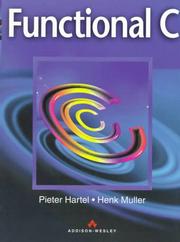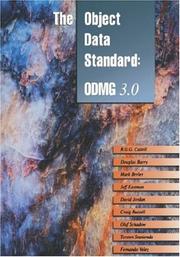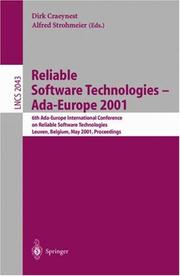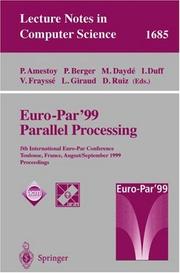| Listing 1 - 4 of 4 |
Sort by
|

ISBN: 0201419505 Year: 1997 Publisher: Harlow Addison-Wesley
Abstract | Keywords | Export | Availability | Bookmark
 Loading...
Loading...Choose an application
- Reference Manager
- EndNote
- RefWorks (Direct export to RefWorks)
Programming --- 681.3*D14 --- C (Computer program language) --- Functional programming (Computer science) --- 681.3*D11 --- Computer programming --- Sequential programming --- Applicative (functional) programming --- C (Computer program language). --- Functional programming (Computer science). --- 681.3*D11 Applicative (functional) programming --- 681.3*D14 Sequential programming

ISBN: 1558606475 9781558606470 Year: 2000 Publisher: San Francisco Morgan Kaufman
Abstract | Keywords | Export | Availability | Bookmark
 Loading...
Loading...Choose an application
- Reference Manager
- EndNote
- RefWorks (Direct export to RefWorks)
Information systems --- Object-oriented databases --- Database management --- Standards --- 681.3*D14 --- -Database management. --- 681.3*D23 --- 681.3*D32 --- Data base management --- Data services (Database management) --- Database management services --- DBMS (Computer science) --- Generalized data management systems --- Services, Database management --- Systems, Database management --- Systems, Generalized database management --- Electronic data processing --- Object-oriented data bases --- Databases --- Object-oriented methods (Computer science) --- Sequential programming --- Coding: pretty printers; program editors; reentrant code; standards (Softwareengineering) --- language classifications: applicative languages; data-flow languages; design languages; extensible languages; macro and assembly languages; nonprocedural languages; specialized application and very high-level languages (Programminglanguages) --- 681.3*D32 language classifications: applicative languages; data-flow languages; design languages; extensible languages; macro and assembly languages; nonprocedural languages; specialized application and very high-level languages (Programminglanguages) --- 681.3*D23 Coding: pretty printers; program editors; reentrant code; standards (Softwareengineering) --- 681.3*D14 Sequential programming --- -Database management --- Object-oriented databases - Standards

ISBN: 3540421238 9783540421238 3540451366 Year: 2001 Volume: 2043 Publisher: Berlin Springer
Abstract | Keywords | Export | Availability | Bookmark
 Loading...
Loading...Choose an application
- Reference Manager
- EndNote
- RefWorks (Direct export to RefWorks)
The Sixth International Conference on Reliable Software Technologies, Ada- Europe 2001, took place in Leuven, Belgium, May 14-18, 2001. It was sponsored by Ada-Europe, the European federation of national Ada societies, in cooperation with ACM SIGAda, and it was organized by members of the K.U. Leuven and Ada- Belgium. This was the 21st consecutive year of Ada-Europe conferences and the sixth year of the conference focusing on the area of reliable software technologies. The use of software components in embedded systems is almost ubiquitous: planes fly by wire, train signalling systems are now computer based, mobile phones are digital devices, and biological, chemical, and manufacturing plants are controlled by software, to name only a few examples. Also other, non-embedded, mission-critical systems depend more and more upon software. For these products and processes, reliability is a key success factor, and often a safety-critical hard requirement. It is well known and has often been experienced that quality cannot be added to software as a mere afterthought. This also holds for reliability. Moreover, the reliability of a system is not due to and cannot be built upon a single technology. A wide range of approaches is needed, the most difficult issue being their purposeful integration. Goals of reliability must be precisely defined and included in the requirements, the development process must be controlled to achieve these goals, and sound development methods must be used to fulfill these non-functional requirements.
681.3*D14 --- 681.3*D15 --- Ada (Computer program language) --- 681.3*D12 --- 681.3*D13 --- 681.3*D2 --- Programming languages (Electronic computers) --- Sequential programming --- Software: object-oriented programming --- Automatic programming--See also {681.3*I22} --- Concurrent programming --- Software engineering: protection mechanisms; standards--See also {681.3*K63}; {681.3*K51} --- Computer Science --- Engineering & Applied Sciences --- 681.3*D2 Software engineering: protection mechanisms; standards--See also {681.3*K63}; {681.3*K51} --- 681.3*D13 Concurrent programming --- 681.3*D12 Automatic programming--See also {681.3*I22} --- 681.3*D15 Software: object-oriented programming --- 681.3*D14 Sequential programming --- Computer science. --- Computer communication systems. --- Special purpose computers. --- Software engineering. --- Computer programming. --- Programming languages (Electronic computers). --- Computer Science. --- Software Engineering/Programming and Operating Systems. --- Programming Languages, Compilers, Interpreters. --- Software Engineering. --- Programming Techniques. --- Computer Communication Networks. --- Special Purpose and Application-Based Systems. --- Computer languages --- Computer program languages --- Computer programming languages --- Machine language --- Electronic data processing --- Languages, Artificial --- Computers --- Electronic computer programming --- Electronic digital computers --- Programming (Electronic computers) --- Coding theory --- Computer software engineering --- Engineering --- Special purpose computers --- Communication systems, Computer --- Computer communication systems --- Data networks, Computer --- ECNs (Electronic communication networks) --- Electronic communication networks --- Networks, Computer --- Teleprocessing networks --- Data transmission systems --- Digital communications --- Electronic systems --- Information networks --- Telecommunication --- Cyberinfrastructure --- Network computers --- Informatics --- Science --- Programming --- Distributed processing --- Ada (Computer program language) - Congresses

ISBN: 3540664432 9783540664437 354048311X Year: 1999 Volume: 1685 Publisher: Berlin Springer
Abstract | Keywords | Export | Availability | Bookmark
 Loading...
Loading...Choose an application
- Reference Manager
- EndNote
- RefWorks (Direct export to RefWorks)
Euro-Parisaninternationalconferencededicatedtothepromotionandadvan- ment of all aspects of parallel computing. The major themes can be divided into the broad categories of hardware, software, algorithms and applications for p- allel computing. The objective of Euro-Par is to provide a forum within which to promote the development of parallel computing both as an industrial te- nique and an academic discipline, extending the frontier of both the state of the art and the state of the practice. This is particularly important at a time when parallel computing is undergoing strong and sustained development and experiencing real industrial take-up. The main audience for and participants in Euro-Parareseenasresearchersinacademicdepartments,governmentlabora- ries and industrial organisations. Euro-Par’s objective is to become the primary choice of such professionals for the presentation of new results in their specic areas. Euro-Par is also interested in applications which demonstrate the e - tiveness of the main Euro-Par themes. There is now a permanent Web site for the series http://brahms. fmi. uni-passau. de/cl/europar where the history of the conference is described. Euro-Par is now sponsored by the Association of Computer Machinery and the International Federation of Information Processing. Euro-Par’99 The format of Euro-Par’99follows that of the past four conferences and consists of a number of topics eachindividually monitored by a committee of four. There were originally 23 topics for this year’s conference. The call for papers attracted 343 submissions of which 188 were accepted. Of the papers accepted, 4 were judged as distinguished, 111 as regular and 73 as short papers.
Parallel processing (Electronic computers) --- Parallélisme (Informatique) --- Congresses --- Congrès --- Computer Science --- Engineering & Applied Sciences --- 681.3*C14 --- 681.3*D14 --- 681.3*E1 --- 681.3*F12 --- 681.3*G12 --- Parallel architecture --- Sequential programming --- Data structures: arrays; graphs; lists; tables; trees --- Modes of computation: alternation and nondeterminism; parallelism; probabilistic computation; relations among modes; relativized computation --- Approximation: chebyshev; elementary function; least squares; linear approximation; minimax approximation and algorithms; nonlinear and rational approximation; spline and piecewise polynomial approximation (Numerical analysis) --- 681.3*G12 Approximation: chebyshev; elementary function; least squares; linear approximation; minimax approximation and algorithms; nonlinear and rational approximation; spline and piecewise polynomial approximation (Numerical analysis) --- 681.3*F12 Modes of computation: alternation and nondeterminism; parallelism; probabilistic computation; relations among modes; relativized computation --- 681.3*E1 Data structures: arrays; graphs; lists; tables; trees --- 681.3*D14 Sequential programming --- 681.3*C14 Parallel architecture --- Parallélisme (Informatique) --- Congrès --- Computer science. --- Computer communication systems. --- Architecture, Computer. --- Software engineering. --- Computers. --- Computer science --- Computer mathematics. --- Computer Science. --- Computer System Implementation. --- Computer Communication Networks. --- Software Engineering/Programming and Operating Systems. --- Theory of Computation. --- Mathematics of Computing. --- Computational Mathematics and Numerical Analysis. --- Mathematics. --- Computer mathematics --- Discrete mathematics --- Electronic data processing --- Automatic computers --- Automatic data processors --- Computer hardware --- Computing machines (Computers) --- Electronic brains --- Electronic calculating-machines --- Electronic computers --- Hardware, Computer --- Computer systems --- Cybernetics --- Machine theory --- Calculators --- Cyberspace --- Computer software engineering --- Engineering --- Architecture, Computer --- Communication systems, Computer --- Computer communication systems --- Data networks, Computer --- ECNs (Electronic communication networks) --- Electronic communication networks --- Networks, Computer --- Teleprocessing networks --- Data transmission systems --- Digital communications --- Electronic systems --- Information networks --- Telecommunication --- Cyberinfrastructure --- Network computers --- Informatics --- Science --- Mathematics --- Distributed processing --- Computer network architectures. --- Information theory. --- Communication theory --- Communication --- Architectures, Computer network --- Network architectures, Computer --- Computer architecture --- Computer science—Mathematics. --- Parallel processing (Electronic computers) - Congresses
| Listing 1 - 4 of 4 |
Sort by
|

 Search
Search Feedback
Feedback About UniCat
About UniCat  Help
Help News
News